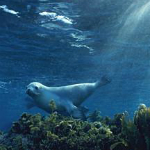Regulator rejects BP's drilling proposal for the Great Australian Bight16th November 2015  The Australian community has achieved a historic victory over offshore oil and gas in the marine environment. The Australian community has achieved a historic victory over offshore oil and gas in the marine environment.
BP is proposing to drill four exploration wells in Commonwealth marine waters in the Great Australian Bight (GAB). The program will seek to determine whether commercial quantities of hydrocarbon resources exist within the permit areas. The wells will be drilled using a mobile offshore drilling unit (MODU) that will either be dynamically positioned (DP), moored with anchors, or a combination of these methods.
On 16th November 2015, the National Offshore Petroleum Safety and Environmental Management Authority (NOPSEMA) decided it was not satisfied with BP’s environment plan for exploration drilling in the Great Australian Bight. NOPSEMA has determined that the environment plan has not “met the criteria for acceptance under the environment regulations”.
The Great Australian Bight is home to an amazing array of marine life, including many threatened and endangered species: Australian sea lions, great white sharks, humpback, blue and southern right whales, southern bluefin tuna, white-bellied sea eagle and albatross. The waters are a critically important marine nursery for the Australian sea lion colonies to raise pups and for southern right whales to nurture their calves. The iconic curve of the coastline is the longest line of sea cliffs in the world, stretching hundreds of kilometres and reaching up to 60 metres high.
The Australian regulations give BP two opportunities to submit a modified plan to NOPSEMA, within agreed time frames. These modified submissions will be assessed by NOPSEMA all over again.
So, unless BP withdraws entirely the battle is not yet won. However, the moral victory for the community is sweet.
***
Wild Migration has a long standing campaign running to prevent oil and gas exploration from impacting sea lions in this critical habitat.
|











